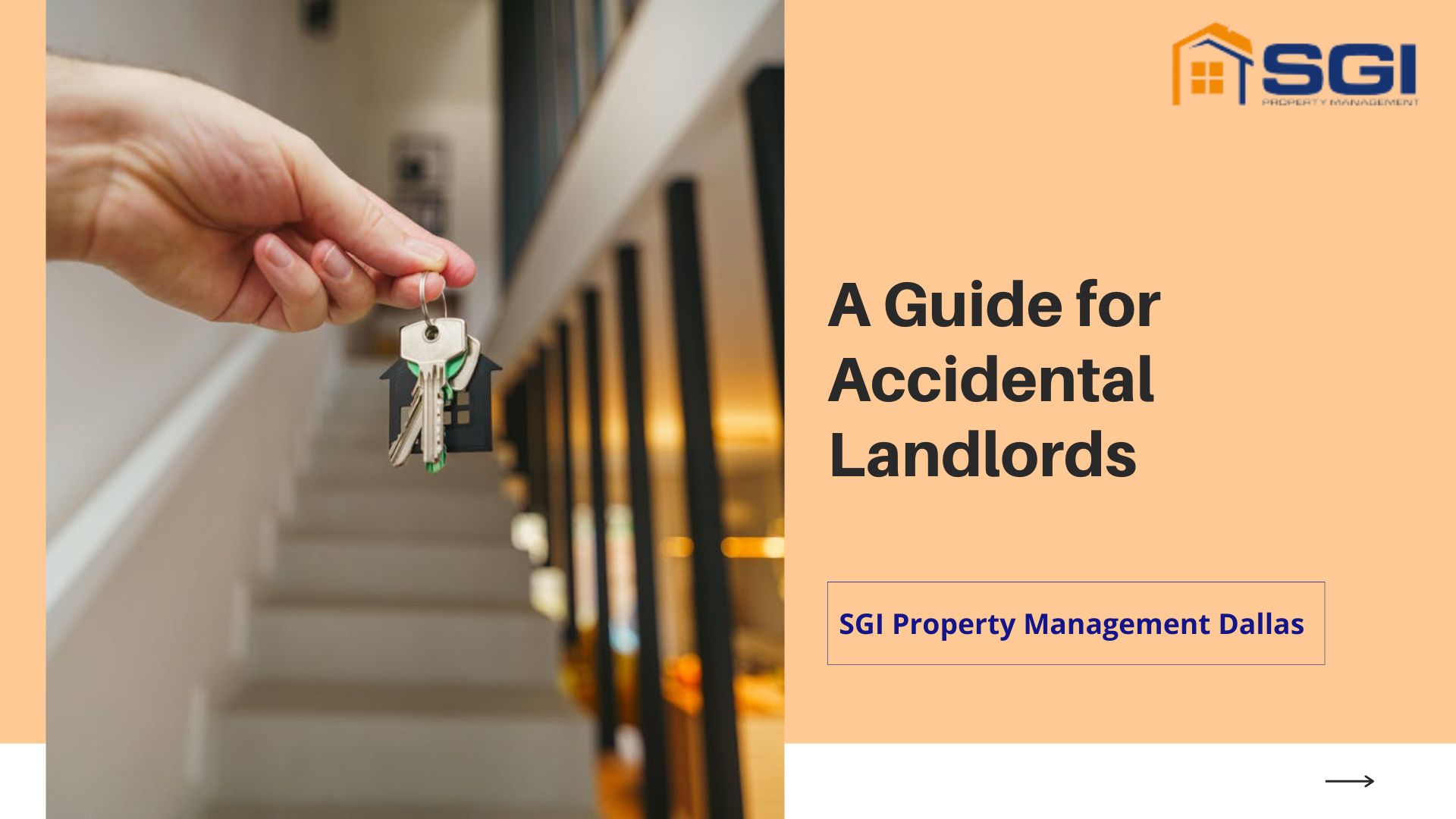
Key Takeaways
Understanding local rental laws is essential – Knowing Dallas-specific regulations helps you avoid legal issues and build trust with your residents from the start.
Careful resident screening and a strong lease are non-negotiable – These foundational steps protect your property, reduce risk, and set the tone for a professional landlord-tenant relationship.
Proactive maintenance and planning for vacancies help maintain consistent income – Keeping your property in good condition and preparing for downtime ensures financial stability.
You don’t have to do it all alone – Partnering with an experienced property management company like SGI Property Management Dallas can simplify the process and turn your unexpected landlord situation into a profitable long-term investment.
Have you suddenly found yourself managing a rental property without ever planning to become a landlord? Many property owners inherit a home, move for work, or decide to hold onto a house they once lived in, only to realize the challenges of renting it out.
From understanding local regulations to keeping residents happy and ensuring steady income, the responsibilities can feel overwhelming if this is all new to you. That’s where a trusted partner like SGI Property Management Dallas can guide you. With the right knowledge and support, you can turn an unexpected situation into a rewarding investment and a steady source of income.
Smart Moves for Dallas’s Unexpected Landlords
Stepping into property management without planning can feel daunting, but you can succeed with the right guidance. Here are eight focused tips every accidental landlord in Dallas should follow for smooth, profitable rental ownership.
1. Understand Dallas Rental Laws
Before you list your property, take time to learn the city’s rental regulations so you know exactly what is required of you as a landlord. Dallas follows Texas state laws covering leases, security deposits, and resident rights, and understanding these rules helps you avoid legal trouble and costly mistakes.
Research topics like fair housing guidelines, notice periods, and eviction procedures so you know what you can and cannot do in every situation. You can find valuable information through local housing authorities and city resources to stay up to date on changing requirements. Knowing these details gives you the confidence to handle issues such as lease renewals or disputes.

Clear knowledge of Dallas rental laws not only protects your property but also shows your residents that you are a responsible and fair landlord, which encourages positive relationships and long-term occupancy.
2. Set a Competitive Rent
Choosing the right rental price is one of the most important decisions for accidental landlords in Dallas. If the rent is too high, the property might stay vacant for weeks, and if it is too low, you lose income. Start by comparing similar homes in your neighborhood to see what other landlords are charging for properties with the same size, features, and amenities.
Remember to consider factors such as school districts, nearby transportation, and the overall condition of your property. A well-maintained home with modern upgrades can support a slightly higher rent, while older spaces might need a more moderate rate. Setting a fair and competitive rent keeps your property attractive to reliable residents and helps you maintain steady income without long vacancies.
3. Screen Residents Carefully
Good residents make all the difference when it comes to maintaining your Dallas property and receiving rent on time. Begin with a thorough application that collects key details like employment history, income verification, and previous rental experience. This step ensures that potential residents meet your financial and reliability standards before they move in.
Follow up with background and credit checks to learn about payment habits and any past issues with evictions or property damage. Take the time to contact previous landlords for honest feedback.

Careful screening helps you select trustworthy residents who will care for your home and follow the lease terms, giving you peace of mind and reducing the chance of late payments or property problems.
4. Create a Strong Lease
A clear, detailed lease protects both you and your residents from misunderstandings. In Dallas, your lease should include payment schedules, late fee policies, maintenance responsibilities, and any specific rules about pets or property use. Make sure the document follows Texas rental regulations so it stands up legally if a dispute arises.
Use simple, easy-to-read language that leaves no room for confusion. Walk through the lease with your residents before signing so everyone understands the terms.
A well-written agreement sets expectations from the start and provides a reference if questions come up later. With a solid lease in place, you safeguard your investment and create a professional, transparent relationship with your residents.
5. Prioritize Property Maintenance
Keeping your Dallas rental in top shape protects its value and keeps residents happy. Schedule regular inspections to spot small issues before they become costly repairs. Check major systems like HVAC, plumbing, and roofing to ensure everything runs efficiently and safely throughout the year.
Respond quickly when a resident reports a problem, even if it seems minor. Timely maintenance builds trust and shows that you care about their comfort, which can encourage lease renewals and reduce turnover. Well-maintained properties also attract higher-quality applicants and help you avoid expensive emergency fixes later on.

6. Plan for Vacancies
Even the best-managed rental may sit empty between residents, so plan ahead to keep your finances steady. Set aside a portion of your monthly income to cover mortgage payments, taxes, and utilities during those periods without rent coming in.
When a lease ends, market the property right away using quality photos and clear descriptions that highlight the Dallas location and nearby amenities. Prompt action shortens vacancy times, keeps cash flow consistent, and ensures your investment continues to generate income year-round.
7. Keep Detailed Records
Accurate documentation is essential for tracking expenses and preparing for tax season. Keep receipts for repairs, maintenance, and upgrades in a secure, organized system. Record rental payments, deposits, and communication with residents so you can quickly answer any questions or resolve disputes.
These records help you identify which costs qualify for deductions and provide proof of your efforts to maintain the property. Detailed bookkeeping also makes it easier to evaluate profitability and plan improvements that can raise your Dallas rental’s value over time.
8. Consider Professional Help
Managing a rental home can be time-consuming, especially for accidental landlords balancing other responsibilities. If tasks like marketing, resident screening, or 24-hour maintenance calls feel overwhelming, professional assistance can be a smart choice.
Bottom Line
Becoming a landlord unexpectedly can feel overwhelming, but the right guidance transforms the challenge into opportunity. SGI Property Management Dallas offers expert support tailored to Texas rental laws and local market trends.
Our team handles everything from resident screening to ongoing maintenance, freeing you to focus on long-term goals. Reach out to SGI Property Management Dallas to discuss your property’s unique needs and explore the options that fit your situation best. With our help, your accidental rental can become a dependable, profitable investment.









